- Home
- Mike Smith
Boko Haram Page 14
Boko Haram Read online
Page 14
At the time of the speech, calm was returning, a large military deployment helping to restore order, but the underlying tensions remained. Jonathan would be sworn in for his first elected term as president amid deep bitterness and resentment in much of the country’s north. While election observers called the polls a significant improvement over previous years despite major problems and said they believed Jonathan to be the legitimate winner, many in the north still felt the vote had been stolen. Some academics and politicians from the north said they were seeing signs of a class war develop since rioters in cities such as Kano went after not only perceived political enemies, but also those believed to be wealthy or corrupt. Tanko Yakasai, a veteran northern politician and power broker, told me in the living room of his home in Kano that he feared something akin to a mass revolt if poverty and unemployment were not addressed. ‘People will come to destroy my house’, he said. ‘Those unemployed youths will just vent out their anger regardless of the consequences, and they will attack anybody who appears to be a well-to-do person.’
The rioting was not caused by the Boko Haram insurgency, but it further exposed the insecurity confronting an inexperienced president and the country he had come to lead through various turns of fate. He would have another reminder after being sworn in for his first elected term under heavy security in Eagle Square in Abuja more than a month after the rioting. In the hours following Jonathan’s inauguration, bomb blasts blamed on Boko Haram went off in four separate cities, killing about 20 people.19
* * *
It was a common refrain before 2011: Nigerians would never blow themselves up for any cause. They were too individualistic. The country can often feel like a brutally cut-throat place – every man for himself, with extremely difficult, if not impossible, odds for the millions of desperately poor. President Jonathan had apparently also subscribed to a version of this view. Back in February 2010, as ex-US president George W. Bush visited Nigeria, he and former secretary of state Condoleezza Rice met with Jonathan, with part of the discussion touching on the case of the so-called underwear bomber, a Nigerian named Umar Farouk Abdulmutallab, and his attempted bombing on Christmas Day two months earlier, when he sought to set off explosives on a flight into Detroit in the United States. The case had shaken Nigerians, but Abdulmutallab had travelled to Yemen and was believed to have been recruited into Al-Qaeda in the Arabian Peninsula, so many people back home viewed him as an aberration.
‘Jonathan joked that “Nigerians don’t want to die” and that suicide bombers like Abdulmutallab possessed “traits alien to the nation”, which were usually inculcated from abroad’, according to a US diplomatic cable describing the meeting with Jonathan, who was then still acting president. ‘He observed that most extremists since September 11 2001, have not come from economically disadvantaged backgrounds and “had stayed in some of the best cities in the world, but received some bad influences while they were there.”’20
The analysis ignored the deep frustration, desperation and hopelessness among young people in his country, not to mention Nigerians’ fervent religious beliefs. Such frustration, coupled with the chance for families to benefit financially and the promise of a better life achieved through martyrdom, would prove to be a recipe for disaster in Nigeria, as it has elsewhere.21
So much would change in 2011, when low-grade, homemade explosives and gun battles would give way to a frightening new reality that the Nigerian authorities were utterly unprepared to confront. The insurgents would use new weapons and strategies, selecting targets that seemed meant to deliberately inflame religious and ethnic tensions. There would be signs of an emerging new offshoot that included members with ties to Al-Qaeda’s arm in northern Africa and which would seek to imitate foreign jihadist groups. But perhaps worst of all, Boko Haram would begin to use suicide bombers with devastating results.
A first glimpse of what lay ahead occurred in June 2011. In photographs and video later distributed to journalists by purported Boko Haram members and posted to a website which was later taken down, a smiling man holding an AK-47 waved from the driver’s seat of a car. He was identified as Mohammed Manga, a 35-year-old with five children who had been a follower of Mohammed Yusuf when the Boko Haram leader was still alive.22 According to those who distributed the images, he was also Nigeria’s first suicide bomber, and the pictures showing him waving goodbye were taken just before his attack.
On 16 June 2011, Manga manoeuvred his car on to the grounds of police headquarters after a convoy that included the national police chief at the time, Hafiz Ringim. It was late morning, about 11 a.m., the building crowded, the car park filled with vehicles. A police warden was said to have intercepted Manga’s car and directed it into an area of the car park to undergo an inspection.23 It was there that the blast would occur, killing Manga, the officer and at least one other person, while destroying rows of cars and leaving a fire blazing in the car park. The police chief’s convoy was not hit, and it was not clear why the bomber had not sought to reach the building or whether the explosives had gone off prematurely. There were also suggestions that the bomber had sought to get out of the car before the blast, raising questions over whether it was intended to be a suicide attack. An initial police statement, however, flatly called it a suicide bombing – Nigeria’s first – and it has since been generally accepted as being such.
A message had been sent. It seemed Boko Haram was now ready to employ suicide attacks, and one of its ‘martyrs’ had barely missed either blowing up Nigeria’s police headquarters or killing the country’s police chief. A man claiming to be a Boko Haram spokesman said the group was ready to deploy more bombers and that the explosives had been brought in from abroad – a possibility, though homemade bombs, even powerful ones, do not require much expertise and explosives are readily available in Nigeria. In a story written by Nigerian journalist Ahmad Salkida, known for having sources within Boko Haram, the spokesman who identified himself as Abu Zaid said Manga acted as something of a runner for Boko Haram when Yusuf was still alive, travelling to neighbouring Benin and also Dubai while helping with an ‘arms build-up’. It was not clear if Zaid meant he purchased arms in those places.
‘Abu Zaid also confided in this newspaper that Manga left a will of over four million naira [$24,000 dollars] to his two daughters and three sons and urged fellow believers to sacrifice their lives for the sake of Allah’, Salkida wrote in his story. ‘This, the group said, is evident in the last-minute pictures of Manga, believed to have been taken at a camp somewhere in Borno state.’24
The extremists were now threatening to take their fight directly into the heart of the Nigerian state. The response from the authorities was, however, little more than the same pattern that would become so familiar and frustrating: condemnation, empty promises about bringing those responsible to justice and then little else. In the days after the attack, Jonathan issued a statement similar to other government responses. The president said, ‘the explosion was an act of terror, which had become a global trend, but assured that the administration was taking steps to ensure the safety of all Nigerians, adding that no incident should be overlooked, no matter the circumstances or location of its occurrence.’25
Two months later, a suicide bomber would seek to drive into police headquarters in Maiduguri in the north-east during screening of potential new recruits, with about 1,500 on site at the time. He would be stopped, police shooting him dead before he set off his explosives and as he tried to drive into the complex.26
The attack on the UN building in Abuja would occur less than two weeks later, instantly transforming the image of Boko Haram, making it a dangerous new threat with unclear aims. It showed how far the extremists had advanced their planning and bomb-making abilities. A source who has seen the security video from the day of the attack said it seemed that advance surveillance had been done on the location by the attackers since the bomber knew to drive his car through the exit gate, which was less closely guarded than the entranc
e side. An investigation that included FBI agents from the United States also found that the bomb had been manufactured as a ‘shaped charge’, intensifying the force of the blast, and included 125 kilograms of explosives, according to Reuters news agency, which saw a copy of the classified report. It was made with both TATP and PETN, common for both military and commercial purposes, and regularly used by extremists worldwide to carry out attacks.27
Nigeria’s intelligence service said the mastermind of the attack was a man named Mamman Nur, who was by some accounts Boko Haram’s third-in-command at the time of the 2009 uprising, behind Yusuf and Shekau. His nationality has been debated, with some claiming he was from Chad or perhaps born in Maiduguri to Chadian parents, while others said he was Cameroonian. He was believed to be among the Boko Haram figures who formed links with AQIM and Al-Shebab, having recently returned from Somalia before the UN attack.28
Nigerian authorities said they received intelligence six days before the bombing that ‘Boko Haram elements were on a mission to attack unspecified targets in Abuja’ and arrested two suspects on 21 August named Babagana Ismail Kwaljima and Babagana Mali. They did not say, however, why they were unable to stop the attack.29
Vinod Alkari, the UNICEF official caught up in the bombing who struggled to help rescue others who were trapped, questioned why more was not done to secure the building ahead of time given the vague warnings. Alkari said that, during UN security meetings he attended, intelligence from the Nigerian government indicating attacks may be in the works against unspecified high-profile targets was discussed. He was not aware of any specific changes put in place on the ground to further guard against such a possibility. UN officials in Abuja did not respond to my requests to discuss the attack, and a spokeswoman at the secretary-general’s office in New York declined to comment on security matters.
Boko Haram would claim credit for the attack. In the alleged bomber’s ‘martyr’ video, a recorded message, purported to be Shekau’s voice, played over an image of him, bearded and wearing a red-and-white keffiyeh and white robe. An AK-47 leaned against the wall behind him, tape wrapped around its magazine. He said that one of the group’s main goals was establishing true sharia law, and that his followers were prepared to die for it.
My Muslim brethren, you should be happy with this incident in Abuja, which is a forum of all the global evil called the UN. May the wrath of God be on them. This forum is better called the United Nonsense, as we’ve been calling it even before we went to war, because this is a centre of Judeo-Christian plots. My Muslim brethren, you should obey Allah. Allah has in many places in the Qur’an forbade Muslims from cooperating with the Jews. And Allah has told us that any Muslim who goes into partnership with the Jews and the Christians is one of them [...].
We feel the agony of what is happening to us year after year, month after month, in many towns. How many years has it taken when our brethren are being killed in many places and everybody knows this is being carried out by Christians? Besides, our mosque was demolished, our brothers killed and we were chased out. We had to leave the city. We raised up and picked up arms to defend ourselves and our religion. In this regard under the pretext of fighting us, they are killing you on all fronts. If you can understand under the pretext of fighting us and naming us Boko Haram, how many people have been killed? [...]
[P]eople should understand that we are not after worldly things. Our main concern is the way the country is being run under the constitution and democracy, where Christians are given the opportunity to demean us. We are out to achieve two aims: one is seeking Allah’s help to establish sharia so that Muslims will have peace to practise their religion, and the second mission, even if we don’t achieve this, there is a higher goal than this; may God cause all of us to be killed, to be wiped off the earth, instead of being alive while Allah’s laws are not adhered to. Don’t take pride in killing us. To us, killing us is a source of pride. What we seek is martyrdom. 30
* * *
When a helicopter landed in Maiduguri in September 2011 carrying former Nigerian president Olusegun Obasanjo, there would be a fleeting moment of hope. With the UN building blown up, hundreds killed across northern and central Nigeria, and the violence showing no signs of abating, it became obvious to many that some form of negotiation would be needed as part of any serious bid to end the insurgency. Obasanjo had flown to Maiduguri for that reason, and after meeting other organisers at the air force base in the city reeling from months of bombings and shoot-outs, he drove with them to the ruins of the mosque where Mohammed Yusuf once preached. A meeting had been arranged and it was to include an audience of about 60 people, a mat spread out under a tree at the site of the destroyed mosque for this purpose. According to an organiser of the meeting, northern-based rights activist Shehu Sani, those in attendance included relatives of the late Boko Haram leader and those identified as insurgents. The main speaker apart from Obasanjo would be Babakura Fugu, Yusuf’s brother-in-law and the son of Baba Fugu Mohammed, the elderly man killed by security forces at the conclusion of the 2009 uprising. Despite a court ruling awarding Mohammed’s family some $600,000 in damages over his death, the government still at that point had not paid.
‘We sat down and had a frank talk’, Sani told me one afternoon a couple years later at a cafe in the Hilton hotel in Abuja, where he had gone for meetings. ‘President Obasanjo told them that he is here on a peace mission [...] and he is passionate about peace and he wants an end to this violence, and he wants to hear their grievances. And now it was then that they came out with a list of their – the “crime”, in quotes, that was committed against them by the state.’
They showed him pictures of supposed Boko Haram members they said had been killed by the security agencies during the crackdown in 2009 as well as documents related to their case against the government.
‘They didn’t ask for court money, but they showed how even a secular order from a secular court could not even be obeyed by even the president himself, by the government’, Sani said. Other points they raised included ‘the need to release some members of the Boko Haram group and also to stop the raiding of houses and arresting of people, and then to look at the possibility of rebuilding the mosque, schools and homes that were [...] demolished by security agencies, and to end the harassment of their wives and children’.
The meeting lasted around four hours, according to Sani. He said he sought to have Obasanjo act as mediator for a few specific reasons, including the fact that he was a Christian from the south, making him less vulnerable to accusations of ‘sponsoring’ the violence, as some northern politicians had been accused of doing. Sani said he also chose him because Obasanjo remained highly influential in Nigerian politics and could speak directly with the president. On top of that, Obasanjo and Sani knew each other, having both been held in the same prison under the regime of Sani Abacha in the 1990s.
Obasanjo, whose commanding presence stands in sharp contrast to Jonathan, accepted the documents and photos presented to him and told them he would speak with the president. Others in the audience took turns speaking, including some who ‘said clearly that they will not stop fighting until justice is done to them’, Sani said. The ex-president listened, but also told them the violence had been counterproductive.
‘He was saying they should stop killings, that it is destroying the image of Nigeria – it is destroying democracy – and that he has listened to their grievances and he will do something about it’, Sani said. ‘He said it is demonising the north as a region, it’s demonising the country, it’s giving us a bad name, and they should stop all these killings.’
There were doubts then, and there continue to be, over whether those Obasanjo met with had any real influence over the Boko Haram that had re-emerged after Yusuf’s death. Babakura Fugu was a relative of Yusuf’s, but it was not clear by any means whether he still had any contact with the group. In any case, Sani said he believed those at the meeting, based on their own assurances, could have
exerted influence over Boko Haram as well as arranged contact with Abubakar Shekau.
After the meeting, Obasanjo and Sani travelled back to Abuja. According to Sani, Obasanjo met personally with his one-time protégé, President Jonathan, and presented him with the documents while describing the meeting. After that, it seems the government did nothing, and Sani said Obasanjo made no secret of his anger over his efforts having gone to waste.
‘What he told me is that he is not happy with the way the president has not taken seriously what he has done’, said Sani, relaying what he says Obasanjo told him. ‘From my own thinking, the security chiefs at that time were those who were putting pressure on the president not to agree to the documents which president Obasanjo brought that may help in ending the insurgency.’
It may not have mattered anyway. Two days later, Babakura Fugu was shot dead in Maiduguri. There were suspicions over whether a faction of the insurgents opposed to negotiations was responsible, while others questioned whether the security forces may have been behind it. A man believed at the time to be a spokesman for Boko Haram’s main faction denied they were responsible, while the military and police also said they had nothing to do with it.

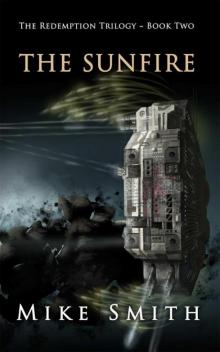 The Sunfire
The Sunfire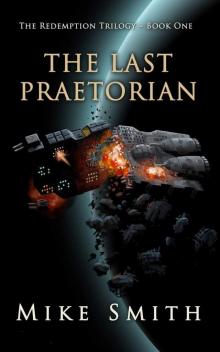 The Last Praetorian (The Redemption Trilogy)
The Last Praetorian (The Redemption Trilogy)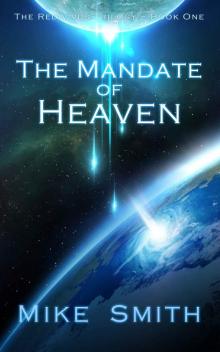 The Mandate of Heaven
The Mandate of Heaven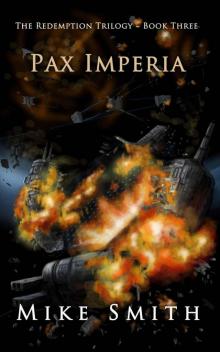 Pax Imperia (The Redemption Trilogy)
Pax Imperia (The Redemption Trilogy)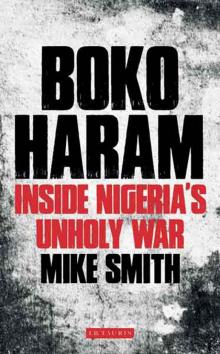 Boko Haram
Boko Haram